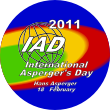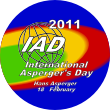This Friday the 18th of February, 2011 is International Asperger’s Day.

Happy 105th birthday Dr Hans Asperger for Friday. I’m getting in early as I’d like to do a couple more posts on Asperger’s in the next few days.
International Asperger’s Day is a day to celebrate the good doctor’s birthday and to increase awareness of Asperger’s Syndrome. So here goes.
Dr Hans Asperger was an Austrian paediatrician who in 1944 described the key features of Asperger’s Syndrome. The syndrome has more recently been classified as belonging on the autism spectrum and can be found sitting near or sometimes on top of high functioning autism.
My 10 year old son has high functioning autism but his behaviours are indistinguishable from someone with Aspergers Syndrome. The key difference lies in the fact that he did not develop speech typically (could not communicate effectively) by the age of three. A historical differentiation which is essentially not important in the grand scheme of things.
Features of Asperger’s Syndrome include intelligence within the normal range and a profile that includes some or all of the following characteristics:
‘A qualitative impairment in social interaction:
* Failure to develop friendships that are appropriate to the child’s developmental level.
* Impaired use of non-verbal behaviour such as eye gaze, facial expression and body language to regulate a social interaction.
* Lack of social and emotional reciprocity and empathy.
* Impaired ability to identify social cues and conventions.
A qualitative impairment in subtle communication skills:
* Fluent speech but difficulties with conversation skills and a tendency to be pedantic, have an unusual prosody and to make a literal interpretation.
Restrictive Interests:
* The development of special interests that is unusual in their intensity and focus.
* Preference for routine and consistency.
The disorder can also include motor clumsiness and problems with handwriting and being hypersensitive to specific auditory and tactile experiences. There can also be problems with organisational and time management skills and explaining thoughts and ideas using speech.’
The above extract is from Dr Tony Attwood’s website which can be found here.
Dr Attwood is the author of ‘The Complete Guide to Asperger’s Syndrome’ which is widely considered the ‘bible’ of texts on the subject. If you can only afford one book on Asperger’s Syndrome, this is the one to buy.

If you’d rather surf the net, his website is the one to go to for all the information and links you could ask for on the subject. I and many others think Tony Attwood is the bees knees 🙂 in this business. He lives and works in Brisbane, Queensland too!
Tony considers that people with Asperger’s Syndrome have a ‘different, not defective, way of thinking’.
I agree.
Further support and information can be found through the volunteer, not-for-profit, organisation Asperger’s Services Australia.

-25.285278
152.872778









You must be logged in to post a comment.